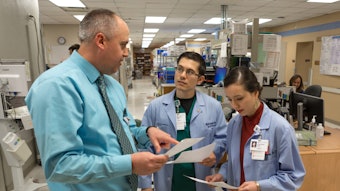Community Pharmacy Residencies Offer Bounty of Opportunities
Community and ambulatory pharmacists have plenty of paths to choose when it comes to their careers.

Community and ambulatory pharmacists make a world of difference in the lives of patients, and student pharmacists are increasingly considering placements in the community setting, where they can take advantage of professional growth opportunities and uniquely impact patients.
A passion for community pharmacy
“This is a place where I can practice at the top of my pharmacist license, make lasting and meaningful connections with patients, and give back to the community,” said Erica Mabry, a PGY1 community-based pharmacy resident at the UNC Eshleman School of Pharmacy in Chapel Hill, and a resident at Eden Drug, an independent pharmacy in the town of Eden, North Carolina, where the population numbers 15,000.
Mabry’s passion for community pharmacy dates back to before she began pharmacy school, when she worked at an outpatient pharmacy, providing patient education and building trusting relationships.
That conviction has been borne out in her experiences at Eden Drug, where she began a residency in mid-2021. Since joining the team, Mabry has worked on a number of projects, including developing a workflow, educational content, and documentation for the dispensing of COVID-19 oral antiviral medications.
“I have been able to accomplish so much throughout just six months of residency, and I know there is so much more to come,” Mabry said.
Helping patients optimize therapy
The prospect of cultivating long-term relationships with patients with chronic illnesses attracted Viktoriya Avlasevich, a PGY1 community pharmacy resident at the University of Rochester Medical Center in Rochester, NY, to the community setting.
Avlasevich is involved in several projects, like helping the University of Rochester Specialty Pharmacy – one of the outpatient locations she is doing her residency rotations at – establish a telemedicine service to increase patient access to clinical pharmacists.
She’s been bitten by the community pharmacy bug, and after her residency, she plans on pursuing a mix of community/ambulatory pharmacy work and teaching or other academic work.
For graduates considering a community-based pharmacy residency, she suggested finding work shadowing pharmacists to get a better sense of the day-to-day responsibilities involved in that field.
Another resource for students is ASHP’s Section of Community Pharmacy Practitioners, which the organization launched in 2019, recognizing that community and ambulatory pharmacy is an important site of care and a setting where pharmacists can take on advanced roles.
A specialty pharmacy residency
Amy Duong, a PGY1 community pharmacy resident at the University of Rochester Medical Center at Strong Memorial Hospital in Rochester, NY, chose a community-based pharmacy residency program with an emphasis on ambulatory and specialty pharmacy.
“In the specialty setting, pharmacists have the opportunity to educate providers and patients on complex medications and emerging therapies,” Duong explained.
Duong will be completing a PGY2 ambulatory care pharmacy residency following the completion of her PGY1. After completing her residency, she wants to pursue board certification in ambulatory care pharmacy and work as a clinical pharmacist embedded within a specialty clinic.











